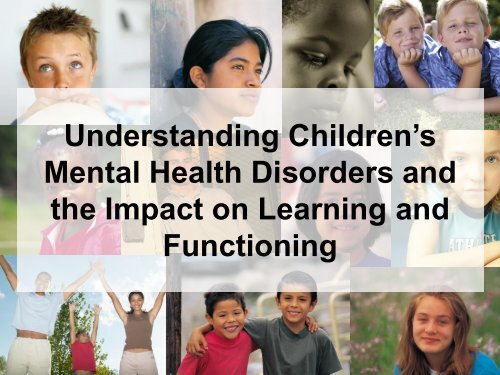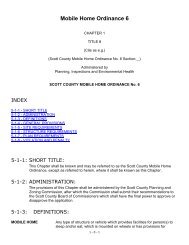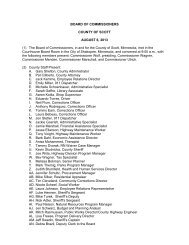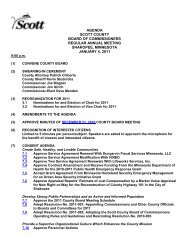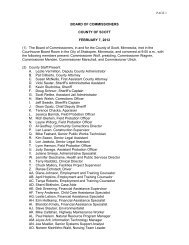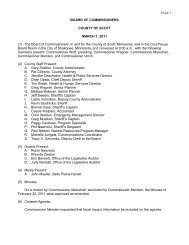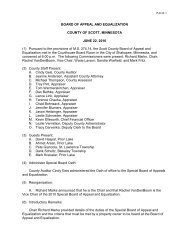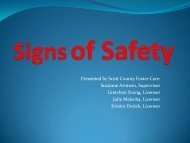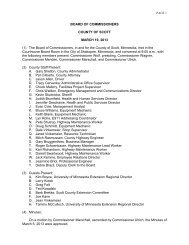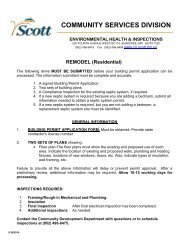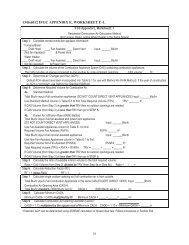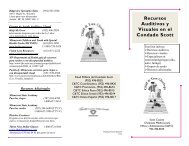Understanding Children's Mental Health Disorders and the Impact ...
Understanding Children's Mental Health Disorders and the Impact ...
Understanding Children's Mental Health Disorders and the Impact ...
Create successful ePaper yourself
Turn your PDF publications into a flip-book with our unique Google optimized e-Paper software.
<strong>Underst<strong>and</strong>ing</strong> Children’s<br />
<strong>Mental</strong> <strong>Health</strong> <strong>Disorders</strong> <strong>and</strong><br />
<strong>the</strong> <strong>Impact</strong> on Learning <strong>and</strong><br />
Functioning<br />
1
Introduction to Children’s <strong>Mental</strong> <strong>Health</strong><br />
An Overview of<br />
Depression<br />
3
Depression is Common<br />
Estimates of Incidence<br />
1 % Preschoolers<br />
2 % School age<br />
5 % Adolescents<br />
20 % Lifetime prevalence during<br />
adolescence (parallels adult life time<br />
prevalence)<br />
Birmaher et al., 2002<br />
4
Risk <strong>and</strong> Reoccurrence<br />
Childhood<br />
Onset<br />
Depression<br />
Adolescent<br />
Depression<br />
Later<br />
Adolescent<br />
Depression<br />
Adult<br />
Depression<br />
5
Depression is…<br />
a mood disorder<br />
a sleep <strong>and</strong> energy<br />
disorder<br />
a thinking disorder<br />
6
Depression:<br />
Signs <strong>and</strong> Symptoms<br />
Mood Changes<br />
Behaviors<br />
MEANING<br />
Interpersonal<br />
Relationships<br />
Physical Changes<br />
Cognitive Changes<br />
School<br />
Performance<br />
7
Mood Symptoms<br />
Sad<br />
Irritable<br />
“mood swings”<br />
Anhedonia<br />
loss of interest<br />
social withdrawal or<br />
isolation<br />
boredom<br />
Anhedonia<br />
Sadness<br />
Irritability<br />
8
Physical Symptoms<br />
Sleep Difficulty<br />
ei<strong>the</strong>r with too much or too<br />
little sleep<br />
Fatigue<br />
Appetite Change<br />
loss of appetite<br />
increased carbohydrate<br />
craving<br />
9
Cognitive Symptoms<br />
Difficulty<br />
concentrating<br />
Increased<br />
distractibility <strong>and</strong><br />
“spaciness”<br />
Decreased<br />
attention <strong>and</strong><br />
focus<br />
10
Cognitive Symptoms<br />
Worried, ruminating<br />
thoughts<br />
Worthlessness, low<br />
self-esteem, guilt<br />
Distortions,<br />
misperceptions,<br />
misinterpretations<br />
11
Symptoms in Infants <strong>and</strong> Toddlers<br />
Mood<br />
– Excessive whining<br />
– Too little or too much<br />
crying<br />
– Withdrawn from<br />
cuddling, being held<br />
– Lack of interest in<br />
surroundings<br />
12
Symptoms in Infants <strong>and</strong> Toddlers<br />
Physical<br />
– Sleep disturbance<br />
– Sad or flat facial<br />
expression<br />
– Little motor activity<br />
– Failure to grow <strong>and</strong><br />
thrive<br />
13
Depression Symptoms in<br />
Preschoolers<br />
Mood<br />
– Frequent sadness<br />
– Irritability<br />
– Low tolerance for<br />
frustration<br />
– Loss of pleasure in<br />
previously enjoyable<br />
activities<br />
14
Depression Symptoms in<br />
Preschoolers<br />
Physical<br />
– Dulled, flat affect<br />
– Frequent,<br />
unexplained<br />
stomachaches,<br />
headaches, <strong>and</strong><br />
fatigue<br />
– Overactivity or<br />
excessive<br />
restlessness<br />
15
Depression Symptoms in<br />
Preschoolers<br />
Cognitive<br />
– Tendency to portray <strong>the</strong><br />
world as sad or bleak<br />
– Distracted, inattentive<br />
16
Depression Symptoms in School-Aged<br />
Children<br />
Mood<br />
– Tearfulness<br />
– Unprovoked hostility or<br />
aggression<br />
– Refusal or reluctance<br />
to attend school<br />
– Little interest in playing<br />
with o<strong>the</strong>rs<br />
17
Depression Symptoms in School-Aged<br />
Children<br />
Physical<br />
– Frequent <strong>and</strong><br />
unexplained<br />
physical<br />
complaints<br />
– Changes in<br />
sleep patterns<br />
18
Depression Symptoms in School-Aged<br />
Children<br />
Thinking<br />
– Drop in grades<br />
– Low self-esteem<br />
– Excessive worrying<br />
– Morbid or passive<br />
suicidal thoughts<br />
19
Depression Symptoms in<br />
Adolescents<br />
Mood<br />
– Irritability<br />
– Feelings of sadness or<br />
hopelessness<br />
– Boredom <strong>and</strong> “I don’t’ care”<br />
– “Bad Attitude”<br />
– Social isolation<br />
20
Depression Symptoms in<br />
Adolescents<br />
Physical<br />
– Changes in sleep patterns<br />
– Eating-related problems<br />
– Increased motor<br />
restlessness<br />
– Physical slowness<br />
– Fatigue<br />
21
Depression Symptoms in<br />
Thinking<br />
– Drop in school grades<br />
<strong>and</strong>/or conduct<br />
– Low self-esteem<br />
– Extreme sensitivity to<br />
rejection or failure<br />
– Morbid or suicidal<br />
thoughts or actions<br />
Adolescents<br />
22
Axon<br />
Neurotransmitters<br />
Dendrite<br />
23
Top 3 Take Home Messages<br />
Underst<strong>and</strong> anhedonia<br />
Thinking is distorted<br />
Communication is inhibited<br />
24
Underst<strong>and</strong> Anhedonia<br />
May be <strong>the</strong> most<br />
debilitating aspect of<br />
depression<br />
May be <strong>the</strong> most<br />
misunderstood <strong>and</strong><br />
misinterpreted symptoms<br />
<strong>the</strong> child with <strong>the</strong> “bad<br />
attitude”<br />
Pay attention to your own<br />
internal responses of<br />
frustration <strong>and</strong> anger<br />
25
Thinking is Distorted<br />
The depressed child’s view<br />
is changed, different <strong>and</strong><br />
distorted from your view<br />
The child is often not aware<br />
of being depressed or<br />
aware of <strong>the</strong> changes to<br />
his or her thinking<br />
Don’t assume that <strong>the</strong> child<br />
knows <strong>and</strong> underst<strong>and</strong>s<br />
<strong>the</strong>ir own depression<br />
26
Communication is Inhibited<br />
They lack <strong>the</strong> words to<br />
describe <strong>the</strong>ir feelings<br />
<strong>and</strong> internal experiences<br />
This leads to fur<strong>the</strong>r<br />
feelings of confusion <strong>and</strong><br />
isolation<br />
Don’t rely on <strong>the</strong><br />
depressed child to “tell<br />
you” what <strong>the</strong>y feel or<br />
need<br />
27
Promoting Wellness in<br />
Depressed Children<br />
Physical wellness<br />
Social <strong>and</strong><br />
emotional wellness<br />
Accessing care<br />
28
Promoting Physical Wellness<br />
– Regular Adequate<br />
Sleep<br />
– <strong>Health</strong>y Diet <strong>and</strong><br />
Nutrition<br />
– Regular Aerobic<br />
Exercise<br />
– Not abusing chemicals<br />
including nicotine <strong>and</strong><br />
caffeine<br />
29
Promoting Social <strong>and</strong><br />
Emotional Wellness<br />
– Relaxation <strong>and</strong> selfsoothing<br />
activities<br />
– <strong>Health</strong>y support<br />
system including<br />
adults<br />
– Engaging in fun <strong>and</strong><br />
recreation<br />
– Personal growth<br />
30
Accessing Care<br />
– Primary care visits<br />
– <strong>Mental</strong> health care visits<br />
– Regular Counseling/ Therapy<br />
– Medications<br />
31
The End<br />
32
For additional information <strong>and</strong> resources contact:<br />
Minnesota Department of Human Services<br />
Phone: (651) 431-2368<br />
E-mail: dhs.cmhs@state.mn.us<br />
Website: http://www.dhs.state.mn.us<br />
Dr. L. Read Sulik, MD<br />
Assistant Commissioner of Chemical <strong>and</strong> <strong>Mental</strong><br />
<strong>Health</strong> Services.<br />
33
References<br />
Birmaher, B. Arbelaez, C. Brent, D. (2002) Course <strong>and</strong> Outcome of<br />
Child <strong>and</strong> Adolescent Major Depressive Disorder. Child Adolesc<br />
Psychiatr Clin N Am July; 11(3) 619-37.<br />
34


